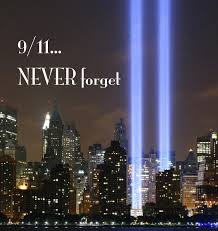
Or we don't.
The 2001 attacks on New York City and Washington D.C. killed almost 3,000 people and left millions with long term respiratory and immune system problems. It caused at least $10 billion in property and infrastructure damage and disrupted business and travel for weeks. And it changed the American psyche, as we realized that we, too, were vulnerable to the violence and mayhem that has characterized the Middle East for a long time.
The American people vowed that we would never forget. We taught about 9/11 in our classrooms. We observed moments of silence and produced special inserts in the papers, programs on TV, movies and books. We constructed memorials, including the National September 11 Memorial and Museum in New York, the Pentagon Memorial in Washington, and the Flight 93 National Memorial in Shanksville, Pennsylvania.
But for many, the events of 9/11 faded into the past. Our own personal lives, filled with tiny triumphs and defeats took precedence.
It is not surprising that the significance of 9/11 has faded for many people in our nation. This, after all, is not the first event that we vowed to never forget.
Remember Pearl Harbor? Remember the Maine? Few of my students could tell you anything about either of these unforgettable events.
This is one compelling reason for reading historical fiction. Historical fiction reminds us of who we once were and what we went through in our past. It personalizes bygone eras so that we can enter into them and see them through fresh eyes. Through these eyes we remember not only the huge events of history, but the tiny triumphs and defeats of other, long ago personal lives. We realize that we are a part of that long, hopeful line that stretches back through countless generations, each with a story to tell.
And we remember.

